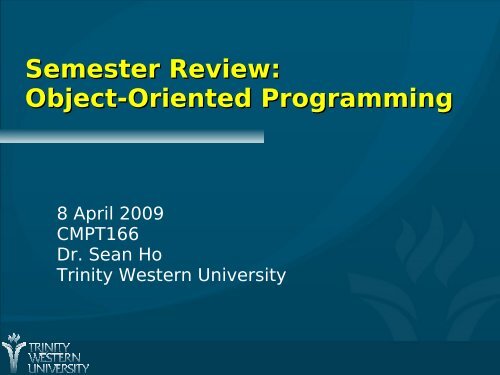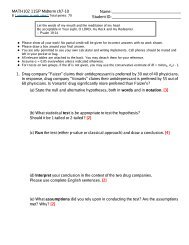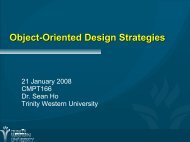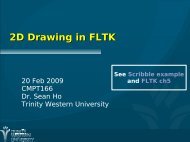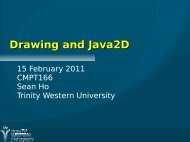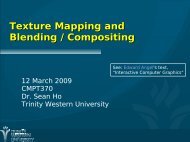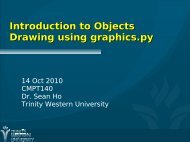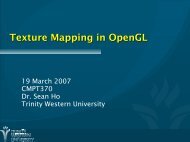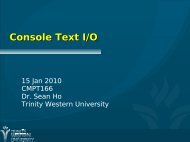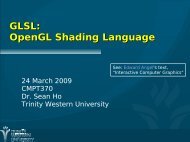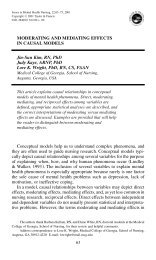Semester Review: Object-Oriented Programming
Semester Review: Object-Oriented Programming
Semester Review: Object-Oriented Programming
Create successful ePaper yourself
Turn your PDF publications into a flip-book with our unique Google optimized e-Paper software.
<strong>Semester</strong> <strong>Review</strong>:<br />
<strong>Object</strong>-<strong>Oriented</strong> <strong>Programming</strong><br />
8 April 2009<br />
CMPT166<br />
Dr. Sean Ho<br />
Trinity Western University
Course topics<br />
Practical: the toolkits<br />
● C++ language, OO constructs, and add-ons<br />
● FLTK and drawing, fractals, etc.<br />
● Sockets and threading<br />
Theoretical: the design process<br />
● Inheritance, class diagrams, templates<br />
● Unit testing<br />
● Use cases, actors<br />
● Design patterns<br />
CMPT166: semester review 8 Apr 2009<br />
2
C++ language<br />
Files: *.h, *.cpp, *.o: compiling, linking, running<br />
● extern<br />
C pre-processor: #include, #define, etc.<br />
for, while, if/else, switch/case<br />
Built-in primitive types; pointers, arrays<br />
iostream, cin, cout<br />
References (&) vs. pointers<br />
● const refs (esp. with operator overloading)<br />
static (at least 2 meanings), namespaces<br />
CMPT166: semester review 8 Apr 2009<br />
3
C++ OO constructs<br />
Writing classes: *.h and *.cpp<br />
Declaring attributes, methods<br />
public / private / protected<br />
Constructor, destructor<br />
● Parameters, default values<br />
● Constructor initializer list<br />
Subclassing, polymorphism, virtual methods<br />
● Abstract (pure virtual) methods/classes<br />
● Compare w/interfaces<br />
CMPT166: semester review 8 Apr 2009<br />
4
C++ add-ons<br />
Exceptions: try/catch, accessing exception obj<br />
I/O: : istream/ostream, getline()<br />
STL ,<br />
STL strings: :<br />
● +, insert(), append(), substr(),<br />
● find/replace()<br />
● length/capacity/reserve()<br />
● Sorting<br />
Templates: methods, classes: declaring, using<br />
CMPT166: semester review 8 Apr 2009<br />
5
FLTK and graphical programs<br />
GUI history: SketchPad, NLS, Xerox, Apple<br />
FLTK: using Fluid, widgets, compiling<br />
Structuring a FLTK program: UI vs. core code<br />
Drawing: <br />
● Simple shapes: line, rect/f, arc/pie<br />
● Complex shapes, transforms<br />
Fractals, using transforms to draw recursively<br />
● Sierpinski triangle, chaos game<br />
● Towers of Hanoi, Gray codes<br />
CMPT166: semester review 8 Apr 2009<br />
6
Sockets and threading<br />
Sockets:<br />
● Networking: 7 layers, IP (v4/v6), TCP/UDP,<br />
DNS<br />
● Client-server design: send/recv<br />
● <strong>Programming</strong>: socket/bind/listen → accept<br />
● Multi-threaded server: switchboard<br />
Threading:<br />
● Concept, shared memory, issues<br />
● Locks (mutex, semaphore); deadlock<br />
● PThreads library: thread callbacks<br />
CMPT166: semester review 8 Apr 2009<br />
7
OO design<br />
Designing inheritance hierarchies<br />
● “is a kind of”, “has a”, “knows how to”, “is a”<br />
UML class diagrams<br />
Design by contract: pre/post-conditions<br />
Unit testing: testing+coding, assert()<br />
Use cases: UML diagram, writing use cases<br />
● Actors, goals, pre/post, basic/alt flows<br />
Design patterns:<br />
● Creational, structural, behavioural<br />
CMPT166: semester review 8 Apr 2009<br />
8
Design patterns: creational<br />
Factory Method (injection mould):<br />
● “Virtual constructor”<br />
Abstract Factory (car parts factory press):<br />
● Platform to create several kinds of objects<br />
Builder (assembling fast food kids' meal):<br />
● Director and hierarchy of Builders<br />
Prototype (biological cell division):<br />
● Copy constructor / clone / deep copy<br />
Singleton (office of the President)<br />
CMPT166: semester review 8 Apr 2009<br />
9
Design patterns: structural<br />
Adapter/ wrapper: Convert the interface of a class<br />
into another interface clients expect<br />
Bridge: split abstraction from implementation<br />
Composite: organize objects into trees<br />
Decorator: dynamically add responsibilities /<br />
functionality to an object<br />
Facade: hide complexities behind simple interface<br />
Flyweight: use sharing to support large numbers<br />
of fine-grained objects efficiently<br />
Proxy: surrogate/placeholder for another object<br />
CMPT166: semester review 8 Apr 2009<br />
10
Design patterns: behavioural<br />
Chain of responsibility: avoid coupling sender<br />
directly to receiver by passing through chain<br />
Command: make requests into objects<br />
Iterator: access all elements of a collection<br />
Mediator: object encapsulating the interactions<br />
of a set of objects: promotes loose coupling<br />
Observer: decouple viewers from the subject<br />
(also: Interpreter, Memento, State, Strategy,<br />
Template Method, Visitor)<br />
CMPT166: semester review 8 Apr 2009<br />
11
Where to go from here?<br />
Computers are tools →<br />
● Computer scientists are toolsmiths<br />
● Know your tools!<br />
● Computing tools are (mostly) free →<br />
the only cost is your time and energy<br />
Languages: the right tool for the right job<br />
● CMPT360<br />
● Java (java.sun.com)<br />
● Python, Ruby/Rails, Scala, etc.<br />
● Learn by coding a small fun project!<br />
CMPT166: semester review 8 Apr 2009<br />
12


